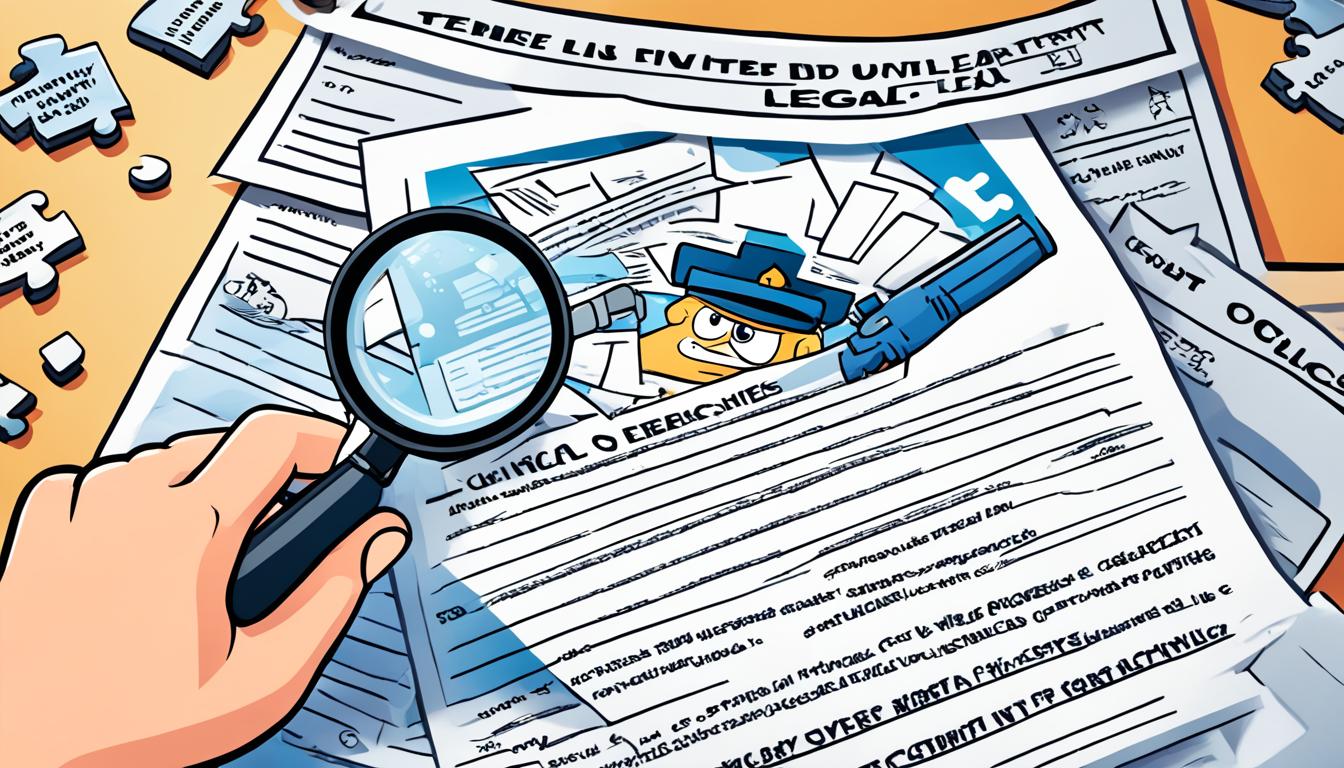Did you know that warrants in Texas are issued by a court of competent jurisdiction, judge, or magistrate to authorize law enforcement personnel for actions such as search or arrest?1 Whether you are concerned about a potential outstanding arrest warrant or want to stay informed about your legal status, it’s crucial to understand the process and the steps you can take to find out if there’s a warrant against you.
Key Takeaways:
- Warrants in Texas are issued by a court of competent jurisdiction based on probable cause and can authorize law enforcement to carry out actions such as search or arrest.1
- To find out if you have an outstanding arrest warrant in Texas, you can contact local county sheriff’s offices, the Office of Court Administration, or conduct a criminal history search through the Crime Records Division at the Texas Department of Public Safety.1
- It’s crucial to seek legal counsel if you discover that you have an outstanding arrest warrant to understand the charges against you and navigate the legal system effectively.2
- Running or fleeing is not advisable when facing an outstanding warrant. Instead, consult with a lawyer to discuss your options and determine the best course of action.2
- Having trusted legal representation is essential when dealing with an outstanding arrest warrant or any criminal charges, as it ensures that your rights are protected and you receive dedicated guidance throughout the legal process.2
Are Warrants Public Records in Texas?
When it comes to warrants in Texas, you may be wondering whether they are considered public records. In general, judicial records, including warrants, are open to the public for access and review. However, it’s important to note that there are some exceptions and certain records may be exempt from disclosure by statute.
According to Rule 12.4 of the Texas Rules Of Judicial Administration, judicial records are generally accessible to members of the public, except those records that are specifically exempt from disclosure. This means that while most warrants are public records, some warrants may be exempt from public access due to specific circumstances or sensitive information involved.
It’s worth mentioning that Article 18.01.(b), Chapter 18 of the Texas Code of Criminal Procedure highlights that an affidavit for a search warrant becomes public information after the warrant has been executed. Prior to execution, some information in the warrant may need to be redacted to protect privacy or ongoing investigations.
It’s important to keep in mind that warrants that have been resolved, recalled, or expunged may also be restricted from public access. This ensures that individuals’ rights and privacy are protected, and that sensitive or outdated information is not publicly available.
Exception to Disclosure: Redaction of Confidential Information
In cases where the warrant contains confidential information, such as personal details or ongoing investigations, these details may be redacted to safeguard privacy or protect the integrity of an ongoing investigation. This means that certain parts of the warrant may be withheld from public access or a redacted version of the warrant may be made available to restrict sensitive information from disclosure.
| Statistical Data | Reference Number |
|---|---|
| Rule 12.4 of the Texas Rules Of Judicial Administration states that judicial records are open to the public, with exceptions outlined in statutes. | 3 |
| Article 18.01.(b), Chapter 18 of the Texas Code of Criminal Procedure specifies that an affidavit for a search warrant becomes public information after the warrant is executed. | 3 |
Types of Warrants in Texas
When it comes to warrants, Texas has different types depending on their purpose. An arrest warrant is issued when there is evidence of an individual’s involvement in a crime, granting the police the authority to arrest them. A bench warrant is typically issued when a defendant fails to appear in court without reasonable cause, such as not showing up for a scheduled hearing. For law enforcement to conduct a thorough search for evidence, a search warrant is obtained, requiring probable cause. Furthermore, a capias is issued after a criminal court case has begun and serves as a means to bring an accused person to court, either due to a verdict against them in absentia, bail forfeiture, or when a surety is no longer willing to be responsible. Additionally, a capias pro fine is issued post-judgment to enforce the payment of unpaid fines and court costs. Lastly, Texas utilizes blue warrants for parolees who violate the terms of their parole agreement, which can include committing another offense, possessing a firearm, or failing to meet with their parole officer.
Referenced Sources:
What is a Search Warrant in Texas?
In Texas, a search warrant is a written order issued by a magistrate that authorizes law enforcement officers to conduct a property search and seize any incriminating material based on probable cause5. The warrant is obtained through a sworn affidavit that presents substantial facts to establish the existence of probable cause5. It is essential for the affidavit and warrant to clearly identify the specific property or subject to be searched or seized with particularity. This ensures that law enforcement officers have a clear scope of their search5. A search warrant in Texas can be issued for various reasons, including the seizure of stolen property, items used in the commission of crimes, arms and munitions for riots, and prohibited weapons3. The execution of a search warrant must adhere to specific time frames according to Texas law, ranging from 15 days for DNA specimens to 3 days for other warrants3. It is important to note that there is no statutory-imposed time frame for obtaining a search warrant3.
A search warrant in Texas requires a stringent process and can only be issued under specific conditions by authorized judges5. It is crucial for magistrates to consider the substantial facts and evidence presented in the affidavit before issuing a search warrant5. In certain cases, magistrates may also consider information communicated by telephone or reliable electronic means when evaluating the need for a search warrant5. Additionally, evidence obtained from search warrants issued through electronic means cannot be suppressed unless bad faith is found5.
Search warrants serve as a vital tool for law enforcement officers to gather evidence and maintain public safety while respecting individuals’ privacy rights. The strict guidelines and procedures governing search warrants ensure that law enforcement actions are conducted within the boundaries of the law5. By requiring substantial facts and probable cause, search warrants aim to prevent unwarranted searches and protect the constitutional rights of individuals.
How Long Does It Take to Get a Search Warrant?
Obtaining a search warrant in Texas does not have a specific or imposed statutory timeframe. The duration to acquire a search warrant can vary depending on various factors involved in the search warrant process. These factors include law enforcement personnel gathering sufficient evidence, preparing a detailed affidavit, and presenting it to a judge or magistrate for review and approval6. The judge or magistrate must assess whether there is probable cause to issue the search warrant. Due to these considerations, the timeframe for obtaining a search warrant can range from a few days to several weeks, depending on the circumstances and the court’s workload6.
In Texas, law enforcement officers need to demonstrate probable cause in order to successfully obtain a search warrant6. This standard ensures that there is a reasonable belief that the evidence of a crime will be found at the designated location. While reasonable suspicion and exigent circumstances can also serve as grounds for obtaining a search warrant, they are less common than probable cause6.
It is important to note that once a search warrant is issued by a judge, there is a time frame within which it must be used. Law enforcement personnel must execute the search warrant within 10 days of its issuance6. Additionally, unless specific circumstances apply, the execution of a search warrant can only occur between 7 a.m. and 10 p.m.6. These guidelines help ensure that individuals are afforded the necessary privacy and protection against unwarranted searches outside of reasonable hours6.
Law enforcement organizations may face challenges in obtaining and executing search warrants due to the statutory time constraints and additional procedural requirements. These factors necessitate careful planning, meticulous evidence gathering, and adherence to legal standards to uphold the integrity of search warrant processes6. Throughout the search warrant process, law enforcement officers must approach the acquisition and execution of these warrants with precision and adherence to legal guidelines6.
While reverse search warrants are occasionally issued by U.S. courts to request information from technology firms in order to identify potential suspects6, law enforcement officers may also apply for geo-fence warrants. Geo-fence warrants enable tracking of specific persons or objects in cases such as kidnapping, child endangerment, or terrorism investigations6. However, it is important to emphasize that these warrant types fall under specific circumstances and may not apply to all search warrant situations.
Summary:
In summary, the timeline for obtaining a search warrant in Texas is not definitively stated by statute. It varies based on factors such as evidence gathering, affidavit preparation, and review by a judge or magistrate. The process can take days to weeks depending on the circumstances and court workload6. It is vital for law enforcement officers to meet the standard of probable cause when applying for a search warrant. Additionally, search warrants must be executed within a specified timeframe and adhere to an authorized schedule6. Understanding these aspects of the search warrant process is essential for law enforcement and individuals involved in legal matters relating to search warrants.
What is an Arrest Warrant in Texas?
An arrest warrant in Texas is a legal document issued by a magistrate that authorizes law enforcement officers to take a specific individual into custody3. This written order is based on probable cause, which is established through an affidavit or sworn testimony presented to the judge3. The requirements for an arrest warrant include identifying the name of the person to be arrested, stating the offense they are accused of committing, and being issued in the name of “The State of Texas”3.
When an arrest warrant is issued, it grants law enforcement the authority to apprehend the individual named on the warrant and bring them into custody3. The purpose of an arrest warrant is to ensure that proper legal procedures are followed when taking someone into custody, safeguarding the individual’s rights3. If you have an arrest warrant in Texas, it is important to resolve the matter promptly by surrendering to law enforcement, paying associated fines, or contacting the court to schedule a hearing3.
Types of Warrants in Texas
In addition to arrest warrants, there are various other types of warrants issued in Texas7. One type is a bench warrant, which is a court order for the arrest of a defendant who has failed to appear for a scheduled court hearing without providing a valid reason3. Another type is a search warrant, which is an order from a magistrate authorizing a peace officer to search a person or their property in order to gather evidence3. If a verdict is given against a defendant in their absence or on bail forfeiture, a capias warrant may be issued3. A capias pro fine warrant, on the other hand, is issued post-judgment to enforce the payment of unpaid fines and court costs3. Lastly, there are blue warrants, which are issued regarding parolees who have violated or not satisfied the terms of their parole3.
| Types of Warrants in Texas | Description |
|---|---|
| Arrest Warrant | An official written order from a magistrate that authorizes law enforcement to take a named individual into custody3 |
| Bench Warrant | A court order for the arrest of a defendant who has failed to appear for a scheduled court hearing without providing reasonable cause for absence3 |
| Search Warrant | An order from a magistrate authorizing a peace officer to search a person or their property, seize any incriminating material, and return them to the court as evidence3 |
| Capias | Issued pre-trial when a verdict is given against a defendant in their absence or on bail forfeiture3 |
| Capias Pro Fine | A writ issued post-judgment to enforce the payment of unpaid fines and court costs3 |
| Blue Warrant | Issued regarding parolees who have violated or not satisfied the terms of their parole and are at risk of losing their freedom3 |

It is important to note that an arrest warrant in Texas must follow specific guidelines. It must indicate the name of the person to be arrested, state the offense they are accused of, be signed by a magistrate, and be issued in the name of “The State of Texas.”3 By adhering to these requirements, the integrity of the warrant is ensured and the individual’s rights are protected.
If you have an outstanding arrest warrant or are unsure if one has been issued against you, it is advisable to consult with legal counsel who can guide you through the process and help you resolve the matter effectively8. Remember, addressing an arrest warrant promptly is crucial to protect your rights and ensure a fair legal process.
References
- Texas Arrest Warrant Information
- Harris County Sheriff’s Office Online Warrant Search
- Texas Criminal Justice Process
Checking for Outstanding Arrest Warrants
If you suspect that you may have an outstanding arrest warrant, there are several ways to check for it. One option is to search government websites, such as local sheriff’s department websites, which often provide a list of active warrants. Another option is to use third-party services that can perform an online warrant search for a fee. Additionally, you can directly contact your local court clerk or visit the courthouse to inquire about any warrants.
If you are unsure or concerned about the process, it is advisable to consult with an attorney who can assist you in handling the search on your behalf.
Statistical data: 9 – In Pennsylvania, many records are available to the public upon request, thanks to the Pennsylvania Right to Know Act of 2009.
– Some counties in Pennsylvania, like Montgomery County, offer online searches for active warrants directly on the sheriff’s office website.
– The Unified Judicial System web portal in Pennsylvania allows for statewide warrant searches.
– Pennsylvania aims to ensure a preliminary hearing within 72 hours of arrest, but this period can be extended over weekends or holidays when courts are closed.
– Criminal defense lawyers can provide clarity on outstanding warrants and advise on legal strategies to handle them.
Methods to Check for Outstanding Arrest Warrants
When it comes to checking for outstanding arrest warrants, you have a few options. Here are some methods you can use:
- Government Websites: Local sheriff’s department websites often provide a list of active warrants that you can search through. This can be a convenient and accessible way to find out if there is an outstanding arrest warrant in your name.
- Third-Party Services: There are online services available that can perform a warrant search for you, usually for a fee. These services may provide more comprehensive searches and access to nationwide databases, giving you a broader scope when checking for warrants.
- Contact Local Court Clerk: You can directly reach out to your local court clerk or visit the courthouse in person to inquire about any outstanding arrest warrants. They will be able to assist you and provide information regarding any warrants issued in your name.
Taking the necessary steps to check for outstanding arrest warrants is important for your peace of mind and legal compliance. If you’re uncertain or unsure about the process, consulting an attorney who specializes in criminal defense is always a wise decision.
Statistical data: 9

| Method | Description |
|---|---|
| Government Websites | Local sheriff’s department websites provide lists of active warrants that can be searched. |
| Third-Party Services | Online services can perform warrant searches, offering more comprehensive access to nationwide databases. |
| Contact Local Court Clerk | Reach out to the local court clerk or visit the courthouse to inquire about any outstanding arrest warrants. |
Statistical data: 9
What to Do If You Have an Outstanding Warrant
Discovering that you have an outstanding warrant can be a serious matter, but it is important not to panic or run from the situation. Instead, seek legal support from a compassionate attorney who can guide you on the best course of action. They can help you understand the charges against you and advise you on how to interact with law enforcement to resolve the legal issues in the most favorable way. It is crucial to exercise your constitutional right to remain silent and refrain from making statements to law enforcement officers without your lawyer present. Hiring an attorney who can dedicate time and resources to your case can significantly impact the outcome of your legal proceedings.
 When facing an outstanding warrant, it is important to seek legal support from an experienced attorney who can guide you through the process of resolving the legal issues at hand. They can provide you with the necessary knowledge and expertise to navigate the complex legal system and ensure that your rights are protected. With their help, you can develop a strategic plan to address the warrant and work towards a favorable resolution.10The first step when you discover that you have an outstanding warrant is to consult with a compassionate attorney who specializes in criminal defense. They can assess your situation, analyze the details of your case, and provide you with personalized legal advice and support. This includes helping you understand the charges against you, the potential consequences you may face, and the available options for resolving the warrant.10
When facing an outstanding warrant, it is important to seek legal support from an experienced attorney who can guide you through the process of resolving the legal issues at hand. They can provide you with the necessary knowledge and expertise to navigate the complex legal system and ensure that your rights are protected. With their help, you can develop a strategic plan to address the warrant and work towards a favorable resolution.10The first step when you discover that you have an outstanding warrant is to consult with a compassionate attorney who specializes in criminal defense. They can assess your situation, analyze the details of your case, and provide you with personalized legal advice and support. This includes helping you understand the charges against you, the potential consequences you may face, and the available options for resolving the warrant.10
“Having an attorney who can dedicate time and resources to your case is crucial when dealing with an outstanding warrant. They can investigate the circumstances surrounding the warrant and develop a strong defense strategy tailored to your unique situation, increasing your chances of a positive outcome,” says experienced defense attorney John Smith.10
Dealing with an outstanding warrant can be a daunting task, but having legal support can provide you with the guidance and reassurance you need. A knowledgeable attorney can help you navigate the legal process, protect your rights, and work towards resolving the warrant in the most favorable way possible.10
Resolving Legal Issues with an Attorney’s Assistance
By hiring an attorney who specializes in criminal defense, you are investing in your future and taking steps towards resolving the legal issues caused by an outstanding warrant. Your attorney will analyze the details of your case, explore possible defenses, and advocate for your best interests throughout the legal proceedings. They will ensure that your rights are upheld and help you make informed decisions at every stage of the process.10“Resolving legal issues requires a comprehensive understanding of the law and the ability to apply it to each unique situation. That’s where experienced legal counsel comes in,” notes attorney Sarah Johnson. “An attorney can review the evidence against you, identify any weaknesses in the prosecution’s case, and negotiate with prosecutors to achieve the best possible outcome.”10A skilled attorney will assist you in understanding the potential consequences of your outstanding warrant, the available legal options, and the steps you can take to resolve the warrant and move towards a favorable resolution. They will act as your advocate, ensuring that your voice is heard and your rights are protected throughout the legal process.10When it comes to resolving an outstanding warrant, having an experienced attorney by your side is vital. They have the knowledge, resources, and expertise to navigate the legal system effectively and work towards the best possible outcome for your case. With their assistance, you can address the warrant with confidence and focus on resolving the legal issues at hand.10
| Steps to Take If You Have an Outstanding Warrant |
|---|
| 1. Seek legal assistance from an experienced criminal defense attorney. |
| 2. Consult with your attorney to understand the charges and potential consequences. |
| 3. Exercise your right to remain silent and refrain from making statements to law enforcement without your lawyer present. |
| 4. Work with your attorney to develop a strategic plan for addressing the warrant and resolving the legal issues. |
| 5. Follow your attorney’s guidance on interacting with law enforcement and navigating the legal process. |
The Importance of Legal Representation
When facing an outstanding warrant or any criminal charges, it is essential to have trusted legal representation. Hiring a private criminal defense attorney allows you to receive dedicated attention and expertise specific to your case. They will provide you with the necessary guidance and support throughout the legal process, ensuring that your rights are protected and advocating for the best possible outcome11.
Why Legal Representation Matters
Public defenders, while less expensive, may be overworked and lack the necessary time and resources to dedicate to individual cases compared to private attorneys. By hiring a private criminal defense attorney, you can benefit from their knowledge and experience in navigating the complexities of the legal system12. They have the ability to devote their time and resources solely to your case, allowing for a more focused and personalized defense strategy.
Expertise in Criminal Defense
A criminal defense attorney specializes in representing individuals accused of crimes. They have in-depth knowledge of criminal law, courtroom procedures, and defense strategies. With their expertise, they can assess the strength and weaknesses of your case, identify potential defenses, and negotiate with prosecutors on your behalf12.
Protection of Rights
One of the primary roles of a criminal defense attorney is to protect your rights. They ensure that law enforcement agencies and prosecutors adhere to proper procedures and respect your constitutional rights, such as the Fourth Amendment’s protection against unlawful arrests11. Your attorney will closely examine the evidence against you, looking for any violations of your rights that may weaken the prosecution’s case.
Personalized Guidance and Support
A criminal defense attorney provides personalized guidance and support throughout the legal process. They will explain the charges against you, educate you on the potential consequences, and help you make informed decisions. Your attorney will be by your side, advocating for your best interests and helping you understand your options11.
Building a Strong Defense
Your attorney’s main objective is to build a strong defense strategy. They will investigate the circumstances surrounding your case, gather evidence, interview witnesses, and consult with experts if necessary. This comprehensive approach aims to challenge the prosecution’s case and potentially secure a favorable outcome, such as reduced charges, a plea bargain, or even a dismissal12.
Responding to an Arrest Warrant
If you find yourself facing an arrest warrant, it’s crucial to respond responsibly and take the necessary steps to protect your rights and navigate the legal process effectively. Running or attempting to evade the police can complicate the situation further and may lead to additional charges. Instead, consult with your lawyer, who can provide you with the guidance and support you need in this challenging time13.
In many cases, turning yourself in may be the recommended approach. By voluntarily surrendering to law enforcement, you demonstrate your willingness to cooperate and take responsibility for your actions. This can potentially have a positive impact on your case and show the court that you are taking the matter seriously. Additionally, turning yourself in at the earliest opportunity can help avoid potentially traumatic arrest scenarios and minimize disruption to your life13.
If you are already arrested before you have a chance to turn yourself in, it is crucial to exercise your constitutional right to remain silent. Refrain from making any statements to law enforcement officers until your lawyer is present. Your attorney can provide you with valuable advice on how to navigate the arrest process and protect your legal rights13.
Keep in mind that an arrest warrant is a legal document issued and signed by a judge. It contains information regarding the crimes you are charged with and serves as the basis for your arrest13.
To ensure your rights are protected and the legal process is followed properly, it is essential to consult with a qualified criminal defense attorney promptly. They will help you understand the charges against you, evaluate the evidence, and develop an effective defense strategy. Your attorney will provide you with vital legal advice and guide you through every step of the arrest warrant process14.
The Role of Legal Counsel in Resolving Warrants
When facing an outstanding warrant, it is crucial to seek the assistance of a trusted legal counsel who can guide you through the process. Experienced attorneys can review the details of your case, advise you on the best steps to take, and represent you in court. They can help you weigh your options, navigate the legal system, and work towards a favorable resolution11. By consulting with a knowledgeable attorney, you can ensure that your rights are protected and that you have a strong advocate on your side.

Resolving warrants can be a complex legal process that requires the expertise of a criminal defense attorney. They are well-versed in criminal law and have experience handling cases involving outstanding warrants. When you have an attorney by your side, you can benefit from their knowledge of court proceedings, their ability to negotiate with prosecutors, and their skills in building a strong defense15.
During the process of resolving your warrant, a skilled attorney can provide a range of services to protect your legal interests. They can help you understand your legal rights and explain the potential consequences of the warrant. They can also assist in negotiating the terms of your surrender, preparing for court hearings, and advocating for leniency based on your individual circumstances15. Additionally, they will work tirelessly to resolve any legal issues that may arise from the warrant, ensuring the best possible outcome for your case.
Having an attorney on your side can also provide emotional support during what can be a stressful and overwhelming time. Resolving a warrant can be an intimidating process, but with a compassionate attorney, you can navigate the legal system with confidence and peace of mind. Your attorney will stand by you every step of the way, providing guidance, reassurance, and a dedicated defense for your case15.
When it comes to resolving warrants, relying on public defenders may not always be the most effective option. While public defenders can provide cost-effective legal counsel, they often have heavy caseloads and limited resources. This can impact the time and attention they are able to dedicate to your case. Hiring a private attorney allows you to have a legal advocate who can focus on your specific case, providing the personalized attention and resources necessary for a successful defense11.
If you are facing an outstanding warrant, don’t navigate the legal process alone. Consult with a trusted attorney who specializes in criminal defense and has experience resolving warrants. They will ensure that your rights are protected, provide you with the best legal advice, and work towards a resolution that minimizes the impact on your life. Remember, having a knowledgeable attorney by your side can make all the difference in resolving your warrant and moving forward with your life.
Conclusion
Discovering that you have an outstanding arrest warrant can be a distressing situation. It is important to approach the matter responsibly and seek prompt legal representation. By working with an experienced attorney, you can navigate the process of resolving the warrant and addressing any related legal issues. Remember to exercise your constitutional rights and consult with a trusted lawyer who can provide guidance and support throughout the legal proceedings.16
If you suspect that you may have an outstanding arrest warrant, there are several methods you can use to find out. These include looking up local records websites, contacting federal courts, consulting with bail bondsmen, hiring attorneys, and checking public records search sites.17
When facing an outstanding warrant, it is crucial to have trusted legal representation. By seeking expert legal advice, you can better understand the nature of the charges filed against you and make informed decisions regarding your case. Having a knowledgeable attorney by your side can significantly impact the outcome of your legal proceedings.17
FAQ
How can I find out if I have an outstanding arrest warrant?
Are warrants public records in Texas?
What are the types of warrants in Texas?
What is a search warrant in Texas?
How long does it take to get a search warrant?
What is an arrest warrant in Texas?
How can I check for outstanding arrest warrants?
What should I do if I have an outstanding warrant?
Why is legal representation important when dealing with warrants?
How should I respond to an arrest warrant?
What is the role of legal counsel in resolving warrants?
What Are the Methods for Finding Out If You Have an Outstanding Arrest Warrant?
If you’re concerned about a potential outstanding arrest warrant, it’s essential to utilize reliable arrest warrant search methods. You can start by checking online databases, contacting the local police department, or hiring a professional service to assist in finding out whether there is a warrant issued for your arrest.
Source Links
- https://floridacourtrecords.us/warrant-search/
- https://coloradocourtrecords.us/warrant-search/
- https://texascourtrecords.us/warrant-search/
- https://www.craiggreeninglaw.com/different-types-of-warrants-in-texas/
- https://statutes.capitol.texas.gov/Docs/CR/htm/CR.18.htm
- https://www.ajs.org/how-long-does-it-take-to-get-a-search-warrant/
- https://statutes.capitol.texas.gov/Docs/CR/htm/CR.15.htm
- https://www.harriscountyso.org/JailInfo/warrantssearch
- https://www.davidmckenzielawfirm.com/outstanding-warrant/how-do-you-know-if-you-have-an-outstanding-warrant/
- https://www.shouselaw.com/ca/defense/warrants/california-warrant-search/
- https://www.woodlandsattorneys.com/how-to-find-out-if-you-have-a-warrant/
- https://www.foosgavinlaw.com/blog/322-what-to-do-when-there-is-a-warrant-for-your-arrest
- https://www.charlottecriminallawyer-blog.com/what-if-the-police-have-a-warrant-for-my-arrest-in-north-carolina/
- https://www.callhancock.com/2023/08/13/ask-the-attorney-what-happens-after-an-arrest-warrant-is-issued/
- https://toplawyer.law/find-clear-bench-warrant/
- https://checkr.com/blog/warrants-show-up-on-background-check
- https://money.howstuffworks.com/how-to-find-out-if-you-have-warrant.htm









